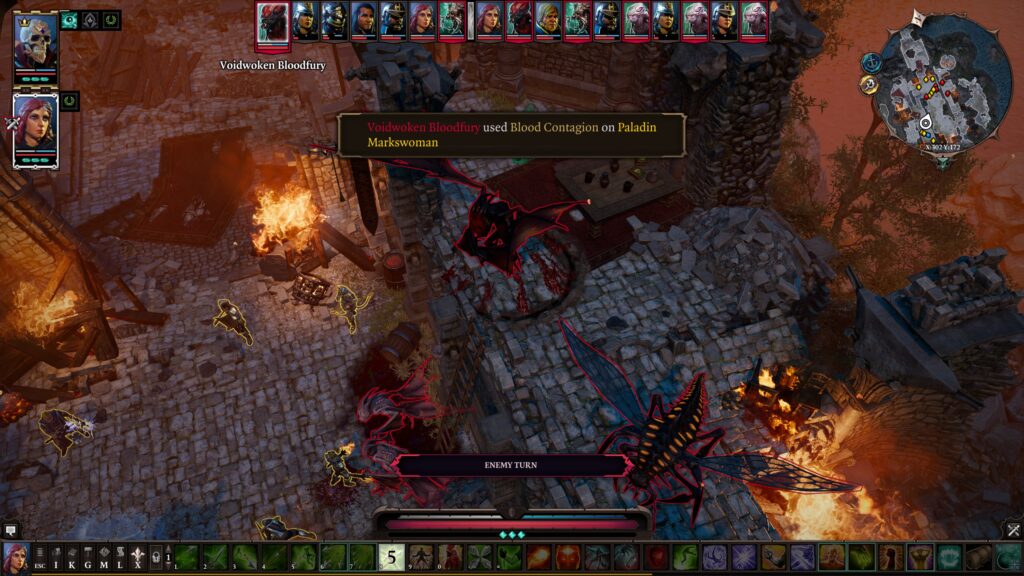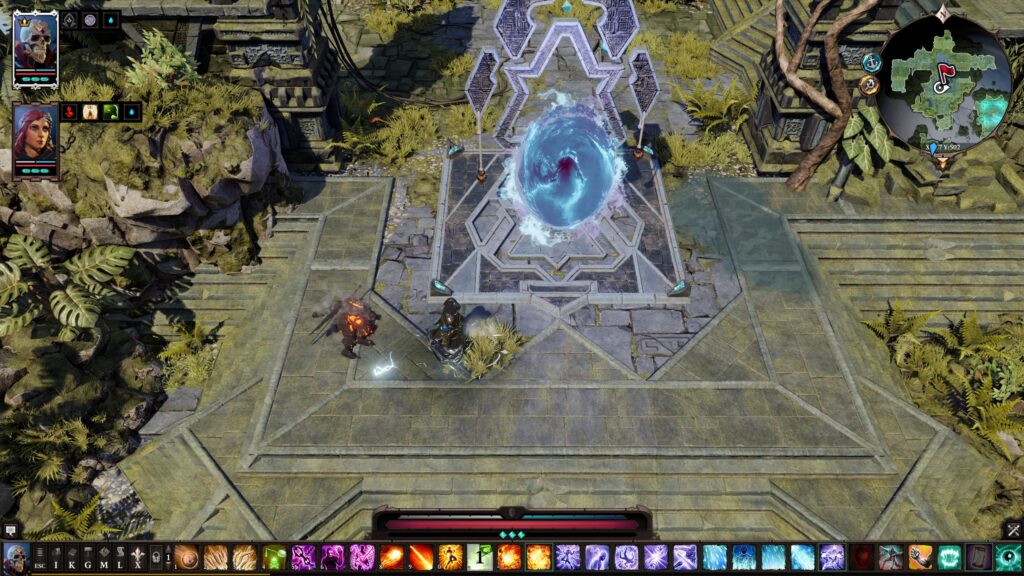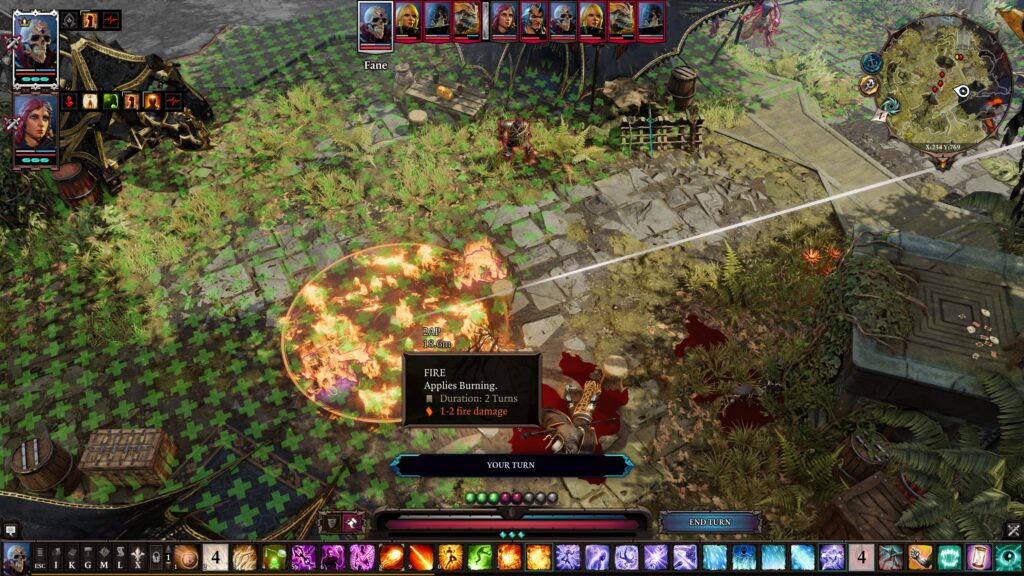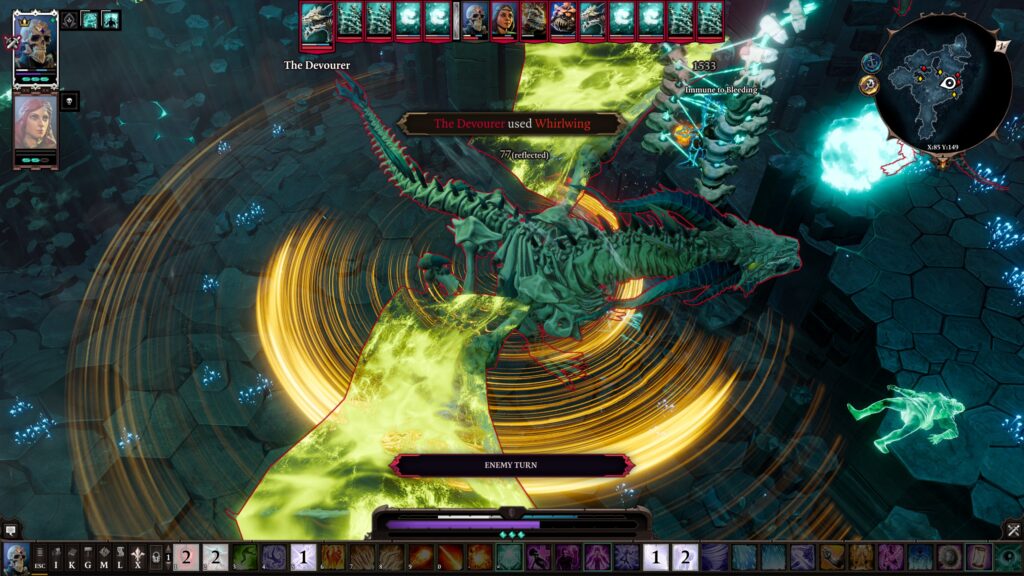
I sung the praises of the first game so how could I not play the sequel especially after Larian followed it up with the highly acclaimed Baldur’s Gate 3? This time around I soon felt that I had bitten off more than I could chew. This sequel is huge, especially with all of added content that is part the Definitive Edition, so there’s so much more of everything. Many of the elements that I liked the first time around were less appealing this time and the annoying things are much worse. It eventually got to the point where it felt like a slog that I had to power through. I still finished the game because I’m stubborn that way and I can understand why it appeals to some power gamers but this wasn’t a game I enjoyed very much at all.
This sequel takes place in the same fantasy world of Rivellon but hundreds of years later so the events of the first game barely matter. Your character is identified as a Sourcerer, someone capable of using Source magic, and is caught by the magisters. Your Source powers are muted by a collar and you are transported to the island prison of Fort Joy. On the way, one of the Sourcerers breaks free, summons a huge Void Kraken and causes the ship to sink. But your character is saved by a mysterious voice later identified as one of the Seven Gods of Rivellon and you are named a Godwoken. You wash up on the shores of Fort Joy, alive but effectively still a prisoner. You witness the magisters led Alexandar and Dallis brutalize the prisoners and learn that there is infighting among them. Alexandar is the son of Lucian, the previous Divine who was revered as a god. With Lucian dead, the world is in disarray and so Alexandar hopes to ascend and rally everyone against the Voidwoken. Naturally the player character doesn’t want this to happen and as many ancient secrets are revealed, has cause to ascend as well. The one constant in this story is that there is no good side as everyone is compromised, corrupted or selfish to some degree.

The story is epic in scope and between the four acts, there is no shortage of places to explore and things to do. It failed to elicit any sort of emotional reaction in me however as the writing is uninspired and the characters uninteresting. Much of the player base seem to approach this game like murder hobos intent min maxing gains from every area and every character instead of experiencing the narrative. The amorality and inherent selfishness of just about everyone you encounter, including your own patron god or goddess encouraging you to kill and seize the Source power of others, rather supports this approach. There is no real good-aligned faction and many quests aren’t solvable in a way that is ethical. so it’s just murder hobos all the way. If you’re just killing, robbing and pickpocketing everyone, who cares what they say or what they think?
All of the crazy environmental interactions that I raved about last time are still here and even expanded upon. I’m less of a fan this time around because like ninety percent of the time, everything will be on fire and that’s it. But the real edge in combat comes from occupying a higher position over enemies. Not only is the damage bonus very substantial but the range advantage changes everything. The number one most valuable power at your disposal are teleport abilities. Want to keep an enemy out of the way for a couple of rounds? Teleport them far, far away, which you can do if you’re way high up. Want to group enemies together so that you can get them all in a single area of effect spell? Teleport them into each other. An enemy warrior caught your caster? Have your caster exchange places with the enemy archer. It’s such a no brainer to pack teleport powers into all of your characters and even carry teleport scrolls because they let you gain total control of the battlefield.

At first, combat in this game is extremely difficult and you need to be careful about choosing the proper fights for your level. Your characters have a very limited selection of powers available and you’re usually outnumbered. Enemies can and will use teleport powers of their own. The game rather evilly likes to put you in nearly impossible situations too such as having your characters start combat being surrounded while a caster type rains spells from up top. Boss enemies have ridiculously powerful buffs and so on. So players learn to cheese fights and do it without guilt. A classic example might be persuading a group of enemies that you’re actually friends. They let walk right into their camp without initiating hostilities so you can calmly position your characters in tactically favorable spots. Then you buff yourself and kick things off with a free attack that is likely powerful enough to take an enemy immediately out of the fight. If this sounds like fun, this game is right up your alley and it gets even more unfair as you gain access to more powers and items.
To me, this does have a certain appeal but I kind of hankered after a more traditional, structured RPG experience after a while especially since the classless system means characters end up being very similar. Nothing stops me from loading up on teleport powers for every character and so I did. Dragging around barrels and other objects to prepare a battlefield in advance of a big fight feels very old school but sometimes I just want a fair, straight up fight you know? Then there’s the fact that the game doesn’t care about balance at all. Later on, you get extremely powerful powers that are fueled by Source which affect large areas of the battlefield. Sounds great but then you get Pyroclastic Eruption which costs the same as the other Source spells but does way, way more damage. How is this balanced? Who knows and who cares? Just keep spamming Pyroclastic Eruption. The same goes for some items, such as one specific object that provides a buff so powerful it can trivialize the final boss fight. That’s just the kind of game Divinity 2 wants to be and some players love it. I don’t.

But my number one pet peeve is that there is so much looting in it and it wastes so much time. A newcomer to the game might take one look and be impressed that there are so many interactable objects on the map. It’s not just a pretty backdrop, all of the chairs, beds, candles, lamps, doors are interactive. Spend enough time playing it however and you’ll realize that it almost never matters. There are some puzzles where interacting with these mundane objects matters but apart from that, it’s all still just decor. Then there are all of the lootable barrels, boxes, shelves and so on. The game is just crammed with them and checking if they contain anything worth taking eats up a considerable portion of the playing time. You could ignore your well-honed RPG instincts and ignore these, confident that they’re all full of vendor trash. Except that sometimes, rarely they do contain awesome gear. There’s even a Lucky Charm talent that you can choose to boost your chances of randomly getting good loot. This means that every useless barrel or box might just contain that one piece of gear that you might need to complete your build. It’s infuriating and it wastes so much time.
There’s plenty more that I could say, such how the crafting system tends to cram your inventory with even more stuff and is pointless most of the time, then you can’t completely ignore it either. Or how the maps are full of secrets, little points of interest and curiosities, but also for that reason feel incoherent as any kind of world that makes sense. Suffice to say that I didn’t enjoy this sequel at all and feel all RPGed out by how much time it took to complete. I realize that this series has a lot of dedicated fans who are very enthusiastic about this style of combat and I even understand why it can be fun to find and ruthlessly exploit all kinds of neat tricks and strategies. But at this point I just want an honest RPG that tells a story you actually want to care about. As far as I can tell, Baldur’s Gate 3 doesn’t quite work this way but I’m more apprehensive about starting it now.

One thought on “Divinity: Original Sin 2 (Definitive Edition)”